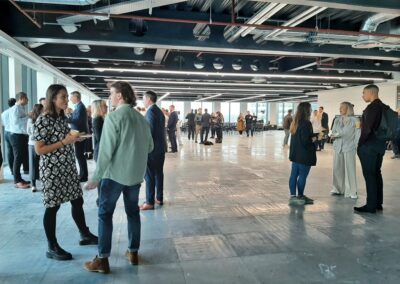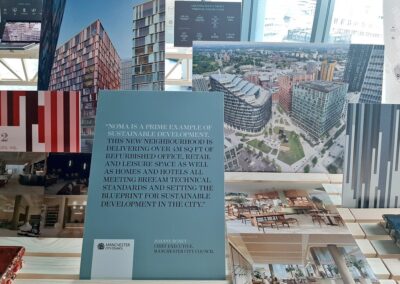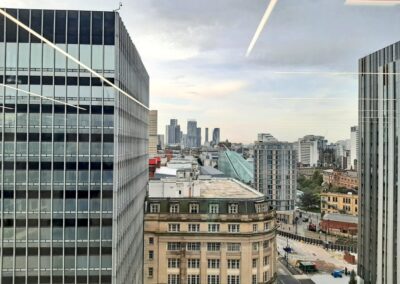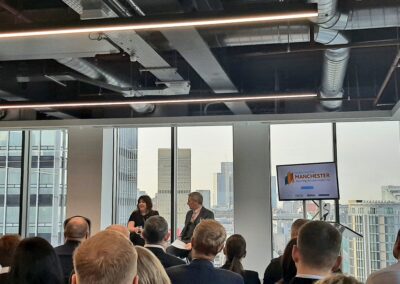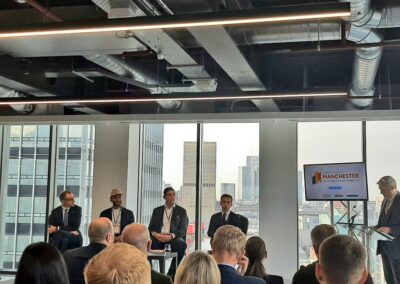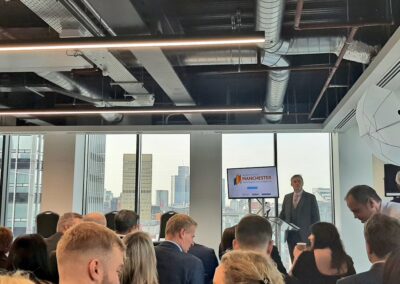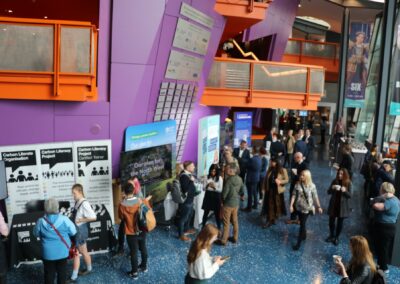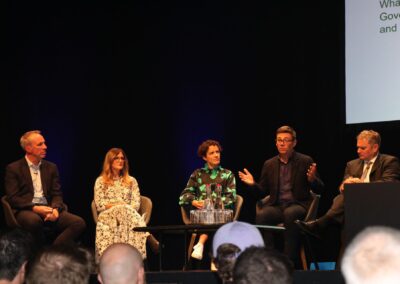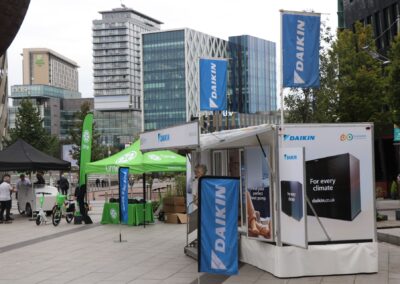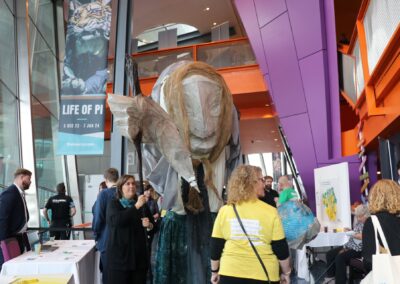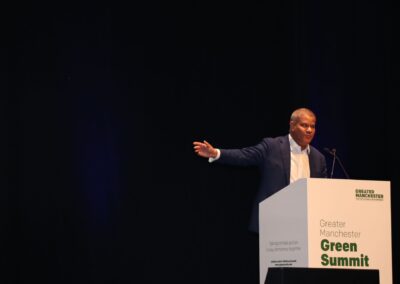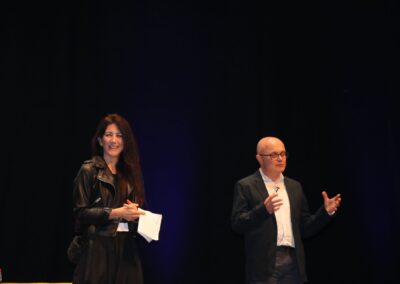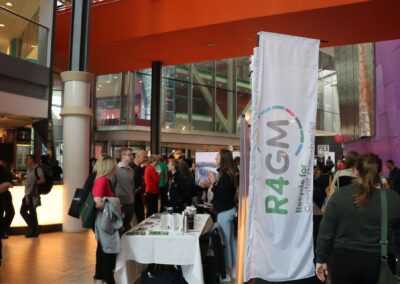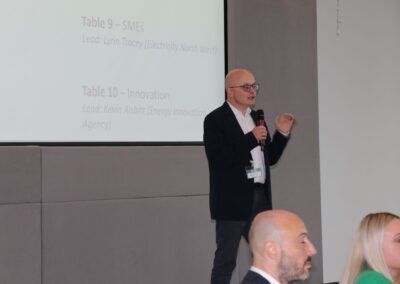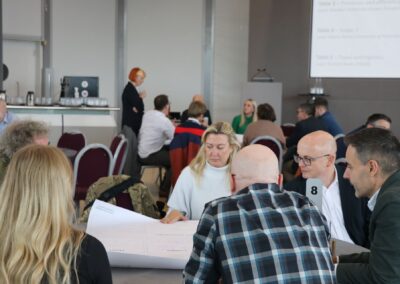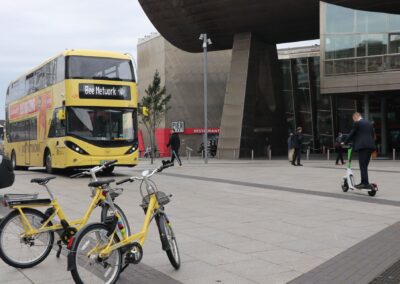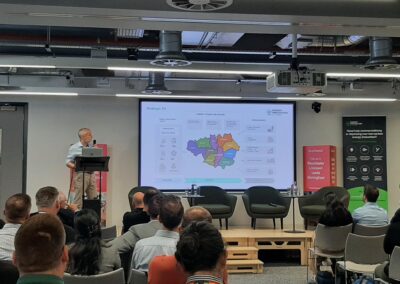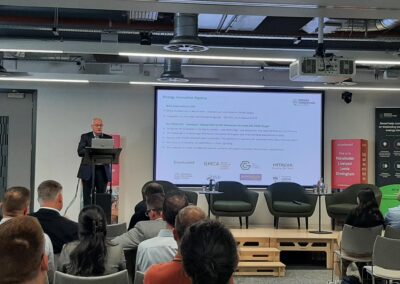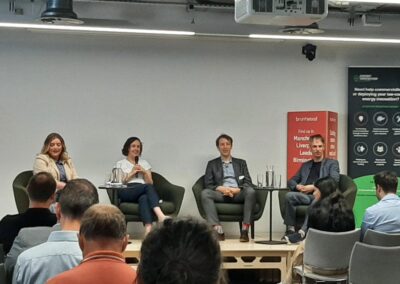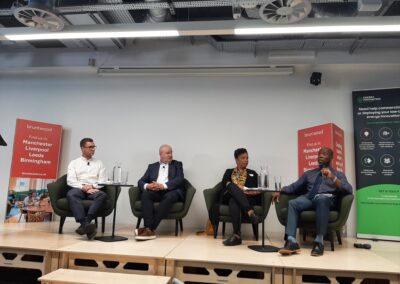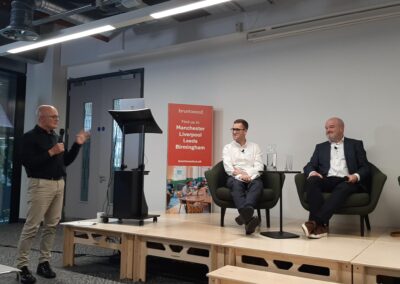Insights
Manchester leaders call on businesses to enhance the city’s liveability credentials
Manchester was recently named the most liveable city in the UK and The Global Liveability Index ranks the city as the 28th most liveable city in the world, with London coming in 33rd.
The cities in the index are ranked according to their political stability, infrastructure, healthcare and access to green spaces. In some of these criteria, Manchester was outranked by European counterparts like Vienna, Copenhagen and Zurich.
At a breakfast event on Tuesday 10 October, Insider Media brought together decision-makers, placemakers and drivers for change across Manchester to discuss Manchester’s standing as a liveable city. Conversations covered what Manchester can learn from other global cities, and how it can become a more attractive place for people to live, work and invest. Panellists also explored how the city can adapt to be suitable for future generations, how it can retain talent and how it can take its leisure and culture offer forward.
Joining the discussions were Joanne Roney chief executive of Manchester City Council, Randel Bryan executive director of Factory International, Dan Hyde development director of MEPC, Stephen Hodder founding director of Hodder + Partners, Stuart Sayer North West strategic lead at Turner & Townsend, Marcus Dixon director of UK residential research, JLL and Professor Andy Dainty pro-vice-chancellor for education at Manchester Metropolitan University.
The panels debated at length Manchester’s growth journey and why it is an extremely liveable city, discussing a neighbourhood-led approach to development and the importance of creating new, free public spaces.
As the event was held in NOMA’s new building, 4 Angel Square, it felt apt to discuss the work MEPC have done to create a new sustainable mixed-use neighbourhood with the community at its heart. NOMA prides itself on nurturing communities, building relationships with local businesses and creating spaces the residents need. NOMA is an example of Manchester’s neighbourhood approach, creating a modern space for people to live, work, create and innovate that has people at the heart.
The panellists discussed how development partners and businesses should prioritise community spaces and the public realm when developing, one of the biggest challenges developers in high-density areas face is creating green, public spaces that work for the communities they serve.
Dan Hyde, Development Director of MEPC said “To give something longevity you need to have diversity and vibrancy. What we’re doing here at NOMA is creating something for everybody based on the green spaces and public realm we’re creating.
It’s important that these neighbourhoods have their own identity, there’s a lot of history and heritage assets around here that give a place an identity. What’s really important as Manchester evolves is connectivity, making sure those neighbourhoods are outward-looking and don’t become an island.”
Stephen Hodder founding director of Hodder + Partners said “Access to communal facilities is absolutely integral to the notion of liveability. St Michael’s will encapsulate everything about liveability. For me, what’s not being talked about in St Michael’s is the new public space we are creating in the middle, that public open space is key to liveability in the city. Wherever possible there is a responsibility to create public realm and green spaces.”
Joanne Roney, Chief Executive of Manchester City Council and Professor Andy Dainty pro-vice-chancellor for education, at Manchester Metropolitan University both called upon Manchester’s business community to support the liveability of the city, by helping to provide new opportunities and pathways for talent. Joanne Roney suggested businesses join the Greater Manchester Good Employment Charter but also support the region’s skills agenda by working with the Greater Manchester Combined Authority to influence the future of integrated and industry-led technical education across the region.
Joanne Roney said “The key to closing the inequality gap is skills and wages. We have an opportunity under the devolution deal to really think about the post-16 skills programme, we really need businesses to work with us. I’m concerned about young people in this city thinking that the city is the place for them, businesses have a role in that by working with schools, supporting t levels and providing apprenticeships.”
Speaking for the University students, Professor Andy Dainty discussed the large volume of students and international students attending Greater Manchester’s universities and the roles that businesses can play in retaining this talent in the region.
Professor Andy Dainty said “We have almost 200,000 students across the city region and that’s a really good success story, we must be doing something right. As someone who has worked at a lot of universities and studied at them, I think that this is the best student city in the UK.
“We retain about 30% of students who come to us from outside of Greater Manchester. One of the ways we can improve this is for businesses to provide work opportunities at any level. There are also all sorts of opportunities for business and the uni to work together and support the innovation ecosystem.”
Stuart Sayer North West strategic lead at Turner and Townsend discussed the need for affordable housing to retain talent and create a truly liveable city that appeals to graduates. As Manchester city-centre grows, it’s vital that young talent can afford to live within it. This also means investing in green spaces and amenities that create a place people want to live in.
Stuart Sayer said “We have a city centre from an early careers point of view which is a really good place to live. Greener spaces, education and healthcare are things we can bring in. I think we’re at a very exciting point in the journey, going from a point where we’re attractive to graduates and that demographic to becoming a truly liveable city.”
Randel Bryan, executive director of Factory International discussed how businesses within Manchester’s growing creative sector are creating more opportunities for local people, helping to retain talent and ensuring that Manchester remains a vibrant, truly exciting place to live.
Randel Bryan said “When you look at Aviva Studios, it’s that brilliant example of the need for commercial infrastructure to be underpinned by a cultural offer. We always need to appreciate that audiences will congregate around great cultural moments and Manchester building and curating these moments lifts the bar of what’s happening in the city.
“The arts are becoming more dynamic career pathways. In terms of making Manchester a more liveable city, people need to have the best years of their life here, they need to want to stay here and raise a family here. But the sector doesn’t work unless you get the talent here and out of London. The idea that you can wake up in Oldham or Moss Side and have some of the world’s leading cultural programmes being made on your doorstep is inspiring and should drive more talent into the sector.”
As Greater Manchester strives to become a greener, fairer, more prosperous city region our leaders, development partners and businesses must work to ensure the city remains liveable. This means creating places that cater to communities and provide much-needed amenities without losing sight of affordability and culture. Businesses and leaders also need to create better opportunities for residents by collaborating on skills pathways, providing access to new industries and opening up routes to work.
A truly liveable city is one in which everyone can succeed and feel like they can live a great quality of life.
As Joanne Roney said “It’s great that we’re growing but let’s not forget the attributes of the city. If we can tackle the challenges, we’ve mentioned today we can be number one. This is without doubt the best city in the world.”
GM Green Summit 2023: Greater Manchester will not deflect on net zero
Monday 2nd October marked the 6th annual GM Green Summit, an event which aims to accelerate climate action across the region. By bringing people from all walks of life across Greater Manchester who are determined to drive change and help the city-region meet its ambitious goals for the environment, the event hopes to find solutions to the biggest challenge facing our generation.
Local authority leaders, businesses, community groups, schools and individuals came together at The Lowry Theatre in Salford Quays. The day included panel sessions, workshops and exhibitions from local businesses and initiatives, aiming to raise awareness for net zero and low carbon solutions. This included a push for The Bee Network, Green Economy and the support available from Electricity North West, The Growth Company and other Greater Manchester organisations and initiatives.
The conference made it clear that Greater Manchester’s outlook on climate action remains positive, despite a turbulent climate and negative news around climate change. The region is putting lots of measures in place to support the transition to net zero and to meet its goal of being zero carbon by 2038.
To open the summit Cllr Tom Ross Leader of Trafford Council and Green City-Region Portfolio Lead at Greater Manchester Combined Authority said “It is clear that there is far more to do but in Greater Manchester, we’re making good progress across the board. The next step is to increase the speed and scale of delivery. To achieve our 2038 target we will need coordinated partnerships between local and national government, universities, communities and more.
To work together to address these issues is something we can all do and together, we can make a difference. By working together we are making a cleaner, greener, fairer city region.”
Throughout the day, Andy Burnham made the region’s stance on climate change clear. He said, “It’s our job to set the strategic direction for the city region as well as putting in schemes to deliver that. I want to make something really clear, we’re not changing our stance on net zero. We are sticking to our path to becoming a 2038 net zero city region. It represents the best opportunity for our region to reindustrialise.”
The Mayor also discussed the colossal challenge that lies ahead of the region in fixing the green skills gap, praising technical education reform across the way as one of the biggest opportunities our region faces. It’s important that Greater Manchester is ahead of the game on green skills but also in driving innovation and behaviour change around green jobs and upskilling.
He also discussed the Bee Network and the region’s dedication to creating an affordable, integrated public transport system that will benefit everyone.
Later that afternoon Sir Alok Sharma, Conservative MP and former President of COP 26 gave a keynote address to the summit.
He said, “You’re doing exactly what needs to happen, bringing together businesses, civic society and local government as well. It is the right approach because we all have a role to play in reaching a net zero society. Summits like this are a great opportunity to bring people together to drive action.
“It is human activity that is causing global warming and that’s why it is up to us to deal with this. If we do nothing at all about climate change it could end up costing up to 20% of global GDP a year.
“The future belongs to the next generation and I think it’s vitally important that civil society groups pressure local, regional and national politicians to act. When you make decisions and decide where to invest your money, please think of the voices of young people in civil society ringing in your ear.”
Net Zero for Businesses
The role of businesses in the region’s transition to net zero was front and centre at this year’s GM Green Summit. The Bee Net Zero partnership held a workshop which aimed to help Greater Manchester’s business community to better understand their journey to net zero and the support available to them. In a hands-on workshop the parentship aimed to discover from business leaders what further support would be useful on the journey to net zero so it could inform action going forward.
Then, representatives from the Greater Manchester Business Board (LEP) took to the stage to discuss the role businesses can play in reaching net zero including a wider introduction to the Bee Net Zero partnership.
Steve Connor Green Lead for the Greater Manchester Business Board said “This transition for businesses is really critical. We started the industrial revolution, if we can pull off the green revolution nowhere can say it’s too difficult. Getting to net zero will give a 6.4% boost to GDP for the nation. Net zero is not a cost, that’s a lie that’s being spread at the moment, it’s an opportunity.
“The Bee Net Zero partnership is going from strength to strength, we’re about to launch a commitment so we can track businesses across Greater Manchester and where they are on their net zero journey as well as work on sector-specific support.”
Lou Cordwell, Chair of the GM Business Board said “Business has got a really important part to play in Greater Manchester’s transition to net zero. One thing I think is really apparent is something that we see on a weekly basis, internationally significant businesses that want to help us. We’re surrounded by people inspired by our purpose. We remain really passionate about the role of business and business working hand in hand with government, academic institutions and civic society.”
Mayor of Greater Manchester Andy Burnham joined a Q&A with some of the summit’s key sponsors Untied Utilities, SSE Energy Solutions, British Gas, Autotrader UK, Deikin and Electricity North West to uncover what these organisations were doing to reach net zero targets.
It also provided an opportunity to shine a light on carbon literacy training and what it means for organisations, awarding two Greater Manchester professionals Carbon Literacy Catalyst Awards for their progressive work in training their organisation.
The rest of the summit gave a voice to other groups including young people, faith groups and community groups. Workshops covered topics like food waste, water management, nature recovery, sustainable electric cars and more to help local people take steps towards net zero.
A core part of this year’s GM Green Summit however, aimed to provide a first look region’s next five-year environment plan for 2024 – 2029 covering natural environment, transport, low carbon, sustainable consumption and adaptation to climate change. The chairs of the current green challenge groups, created to accelerate action against different areas of the Greater Manchester Environment Plan took to the stage to discuss achievements so far.
To learn more about the Greater Manchester green summit, visit the GM Green City website.
Learn more about how Bee Net Zero can support your business on the journey to net zero, here
Chanel to show Métiers d’Art collection in Manchester
Chanel has announced that its next Métiers d’Art show will be held on 7 December in Manchester, England. The Métiers d’Art show is held in cities that inspire the house and past iterations have been held in Tokyo and Dakar. Manchester’s rich industrial past and deep connections to music and art culture have landed it on Chanel’s map.
Destination shows have drastically ramped up since the pandemic. In the last six months, Dior showed in India; Gucci showed in Seoul; Saint Laurent in Berlin and Versace in Los Angeles. Chanel itself also showed its cruise collection in LA, which it will repeat in Chinese city Shenzhen this November. The shows — which invite VIP attendees and take place outside of the high-volume of tentpole fashion seasons — can drive crucial buzz for brands during otherwise quiet calendar moments.
As the world’s first industrial city, Manchester, is best known for being an industrial hub for textiles in the 19th century. The city and its surrounding boroughs were once home to over 100 cotton mills, fondly known as “Cottonopolis”. The city’s architecture still reflects its history in textiles, with the mostly now-defunct mills converted into housing forming most of the city’s skyline.
In more recent years the city has become renowned for its connection to music, as the birthplace of bands The Smiths, Joy Division, New Order and Oasis.
Chanel will be the first major luxury house to show in the UK second city, but Manchester has been known to inspire collections from designers like Raf Simons and Haider Ackermann, who showed in Manchester last year to present his collaboration with Fila.
Chanel said in a statement “Métiers d’Art collections are designed to show off Chanel’s speciality ateliers, from milliner Maison Michel to embroiderers Lésage, which the brand has gradually acquired over the last forty years, Presented in cities and places that inspire the House, from Tokyo to New York, via Dakar last year, this collection bears witness to the historic commitment of Chanel to this exceptional artisanal heritage and its influence around the world.”
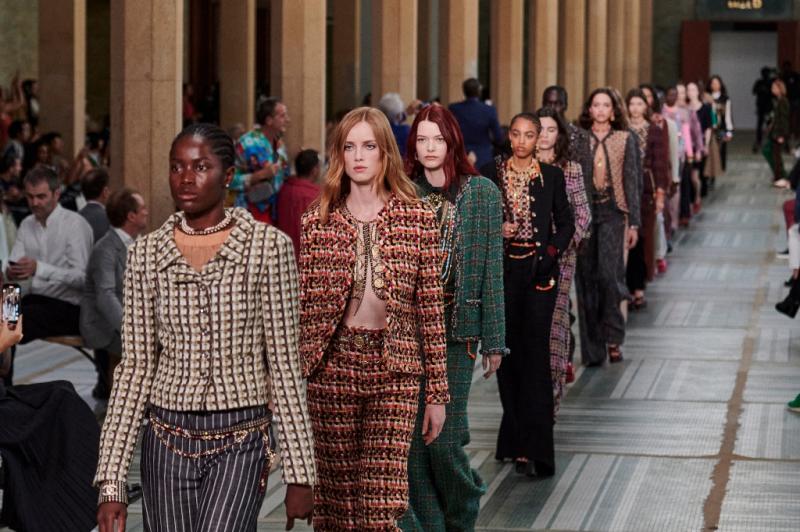
Plans for Salford Crescent Innovation North announced
Plans have been submitted for up to 933 new homes, as well as 1.7m sq ft of new commercial innovation floorspace, academic and research floorspace, as part of Crescent Innovation North a key part of the wider £2.5bn, 252-acre Salford Crescent masterplan.
The plans from Muse Holdings, in a JV with Salford City Council, The English Cities Fund (ECF), and the University of Salford will see the area where people, industry and academia will meet and will focus on creating a research, development and innovation campus at the university.
Julian Stott, Development Director at Muse Holding said:
“The vision for Crescent is unique and we’re working hard for the people of Salford to turn that vision into reality.
“People make place and Crescent Innovation North, as an important stage of major regeneration, will connect communities across the city to opportunities to enable them to thrive and prosper.
“Together with the community, the university and the city council, we’re forging ahead with our collective vision to create a robust and resilient Salford that’s seen on a global stage as a leader of innovation, collaboration and placemaking.”
Vice-Chancellor at the University of Salford, Professor Helen Marshall, commented: “This is another exciting step in bringing greater prosperity to our pioneering city, through innovation and applied research.
“This development will help facilitate collaboration across the region and help build a network of innovation support and development, to help businesses grow and become even more successful. Specifically for the university, it will offer a new way to engage with our long-standing partners and to develop and attract new partners.”
Salford City Mayor, Paul Dennett, said: “It is fantastic news to see that our ambitious plans for Crescent Innovation North are moving forwards.
“With our Crescent partners – the English Cities Fund and University of Salford – we are pushing ahead with our vision to create world-class research and development facilities that local people and businesses can benefit from.
“The Crescent Innovation North proposals are a key element of the wider vision for the Crescent area and will change the face of the area through the creation of a high-quality innovation environment, where people can achieve their full potential.”
The whole masterplan will see the delivery of over 3,000 homes, over 1m sq ft of space to innovate and collaborate, alongside 1m sq ft of offices, retail, leisure, a new multi-modal transport hub with active travel at its heart, set within vast areas of green space.
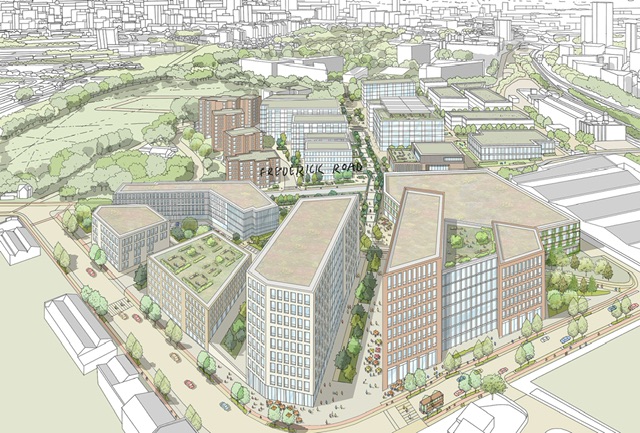
Salford set to become arts and culture hotspot thanks to major funding boost
The announcement and confirmation of the funding follows a bid submitted by Salford Culture and Place Partnership, led by Salford City Council. It will now see the partnership working with cultural organisations, creative groups and residents across the city as part of the project to bring fun, entertaining and wellbeing focussed activities to the city’s parks, gardens, high streets and neighbourhoods.
As part of the three-year programme, local organisations will create events and activities focused round different themes:
- RHS Garden Bridgewater will develop a new Working Wood for young people to benefit from the benefits of traditional woodland craft activities.
- Outdoor arts organisation Walk the Plank will train ‘Creative Explorers’ to bring new creativity and adventure to city events.
- The team behind Sounds From The Other City will have people dancing in the streets with mini pop-up music festivals.
- ‘We Invented the Weekend’ will again transform MediaCityUK and the Quays into a family friendly festival celebrating free time.
- Local artists and creative groups will also be invited to develop and test new event ideas through a ‘Make it in Salford’ programme and schools in the city will get creative through new artist commissions led by the Salford Local Cultural Education Partnership.
Salford City Mayor Paul Dennett said:
“This is great news for the city and our residents. We have a thriving cultural sector in the city doing great work all-year round, through our world-class cultural institutions, like The Lowry theatre and art gallery, Media City, the BBC Philharmonic Orchestra, and RHS Garden Bridgewater.
“The city’s cultural sector is also comprised of fantastic arts organisations such as Walk the Plank, Islington Mill and From The Other, not forgetting those organisations that play an instrumental role in delivering on our creative health ambitions such as START Inspiring Minds and DIY Theatre Company.
“The successful bid and funding from the Arts Council England will enable the city’s rich, vibrant and unique cultural ecology to further our commitments to animating the city and place-making, making Salford a destination and a place where artists, creatives and makers from all walks of life can live, work and make their work, whilst also ensuring that art, creativity and making are accessible for everyone in the city.
“This crucial funding, especially in this 13th year of austerity and with on-going financial challenges in local government, will now mean that plans for a programme of events, developed with partners and residents, can now be brought to fruition for everyone to experience.
“The funding will also allow us to build on the progress we’ve made in animating the city following the COVID-19 pandemic, whilst also reflecting and learning from our inaugural Festival of Free Time: We Invented The Weekend. With this positive news and our city’s recent cultural successes, it really does promise to be an exciting time to write the next chapter of Salford’s cultural history.”
Jen Cleary, Director North, Arts Council England said:
“I’m very pleased that we have awarded £749,600 through our National Lottery Projects Grants to support this ambitious creative programme in Salford.
“It is a fantastic opportunity to enable the city’s artists and creatives to share more of their work in public spaces such as parks and high streets for the benefit of local residents and visitors. It’s an exciting time for Salford and I’m looking forward to experiencing some of the programme over the next three years.”
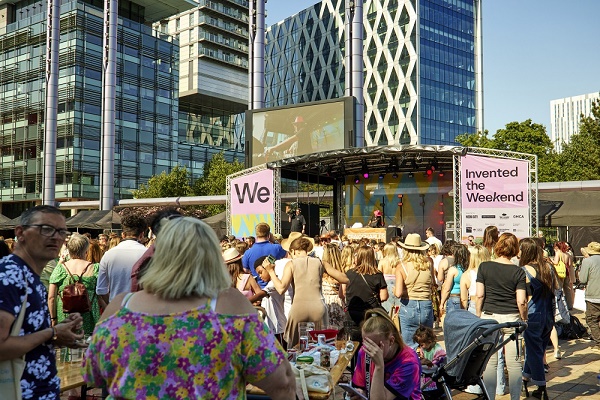
Business Leaders and Innovators join forces to discuss net zero challenges
Greater Manchester Business Board (LEP) members, local business leaders and net zero innovators came together at Bruntwood’s Circle Square on 13th July 2023 for The Energy Innovation Agency’s event “Net-Zero for Greater Manchester – challenges and innovation opportunities”.
The event provided an opportunity for those passionate about decarbonising to network, allowing innovators and end users to meet with the view of closing crucial testing gaps in the innovation cycle and accelerating the commercialisation of green technologies.
Throughout the event, which was chaired by Greater Manchester Business Board (LEP) Green Lead Steve Connor, leaders in the space were invited to join panels which discussed the biggest energy challenges business are facing as well as guidance for helping them to reach net zero.
The day began with an introduction to the Energy Innovation Agency, its goals and how it works with innovators and end users to help Greater Manchester overcome energy challenges. The Energy Innovation Agency aims to create direct alignment between net zero projects and local strategy and enhance the relationship between industry and academia to position Greater Manchester as a destination of choice for innovators. It aims to create pathways to commercialisation making it more accessible and straightforward for innovators. Through cross-sector collaborations it aims to help businesses in the region overcome their biggest energy challenges, as well as helping to foster public confidence in new approaches and technologies.
Peter Emery, chair of Greater Manchester’s Energy Innovation Agency discussed the importance of investment in R&D, saying “In our view the race to net zero is simple, it’s about welcoming innovation. What we’re trying to do is get deployment at scale. Success will only be achieved when these solutions are economically attractive vs fossil fuel alternatives. Unless net zero innovations are competitive, they aren’t going to fly on a long-term basis. Broadly speaking our role is one of facilitation, support, advice and access. This is a major challenge, and we’ll try and play our part to make it happen.”
The first-panel session of the day discussed Greater Manchester’s Energy Challenges. Sarah Bateman, CEO of Unify Energy, Ben Peace Net Zero Principal at The Growth Company and Green Economy, Aisling McNulty Development Director at Bruntwood Works and Richard Hagan Managing Director of Crystal Doors joined the conversation with Steve Connor.
The panel discussed the challenges for businesses adopting green technology from a lack of investment and accessibility to a lack of knowledge and finding the right support.
Ben Peace said “A lot of businesses don’t really know where to start, they’ve heard about a range of technologies but it can be happenstance which technology they zero in on. They need support at scale, direct and on-site to know which technology is going to deliver quickly and efficiently.”
Sarah Bateman said “Accessibility is the big issue. There aren’t enough solutions in the market for SMEs to access. We’re operating in a really tough economic climate and the last thing companies want to do right now is focus on something they don’t need to do until 2030. Innovation as a word and concept may be scaring people. We are living in tough times and people will be risk averse.”
The next panel was all about The Green Skills Gap and how Greater Manchester is working to address this critical issue in the race to Net Zero. Joining Steve Connor for the panel was fellow Greater Manchester Business Board (LEP) member Dr Marilyn Comrie, Roosevelt Alexander Director of Skills at the Growth Company, Rory Matthews Senior Policy and Partnerships Officer for Low Carbon at Greater Manchester Combined Authority and Chris Fletcher GMLSIP Director and Policy Director at the Greater Manchester Chamber of Commerce.
The panel discussed the green skills gap and the benefits of Greater Manchester’s trailblazing devolution deal in solving this as well as how to improve diversity in this space and engage young people from a range of backgrounds in Green Careers. Speakers discussed the advantages of Greater Manchester’s Green Skills Academy, which is led by The Growth Company, The Manchester Innovation Activities Hub and the new GMLSIP and technical education plan.
Dr Marilyn Comrie said “The climate emergency is providing a once-in-a-generation opportunity to create a just transition. It presents an opportunity to normalise having people that look like me and my sons involved in creating the solutions that will save the planet. Because it is so pressing, it is creating a wealth of opportunities and opportunities for local people to get skills training and get into well-paid jobs.
A skilled workforce is absolutely essential, it’s not just about research, we need the people. We need to upskill, reskill and train people and we need them quickly. Employers are telling us they can’t wait for a four-year apprenticeship, they need training programmes that will help them to access people that they need now.”
Chris Fletcher said “There’s no silver bullet solution to this but it is right across the piece. It’s not just people fitting the kit, it’s the support mechanism. The business itself has a role to play to encourage people and say this is for everybody. There is such a demand for this it isn’t going to disappear anytime soon, there needs to be more engagement between businesses and potential employees.”
Rory Matthews said “What we might see down the line is the wave of enthusiasm of young people driving the change like never before. At the moment we’re at a local minimum but we need to invest more to unleash some incredible solutions.
“The devolution deal will be important to understanding the challenges at a local level and not having a one sized fits all approach that isn’t tailored to a locality and isn’t generic across Greater Manchester.”
The afternoon session provided an introduction to Innovate GM and The Built Environment Demonstrator Funding, showing innovators and businesses how they could get involved.
To learn more about The Energy Innovation Agency and how they support businesses across Greater Manchester visit their website.
The Bee Net Zero partnership has come together to simplify your business’s journey to net zero. Learn more about the support available across the region.

